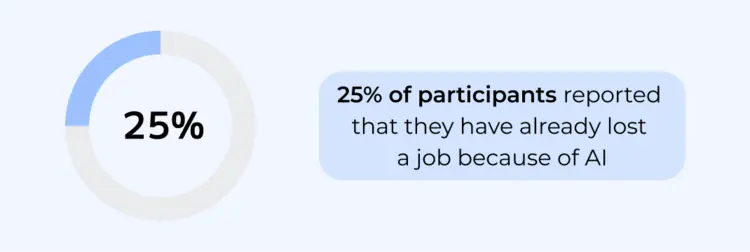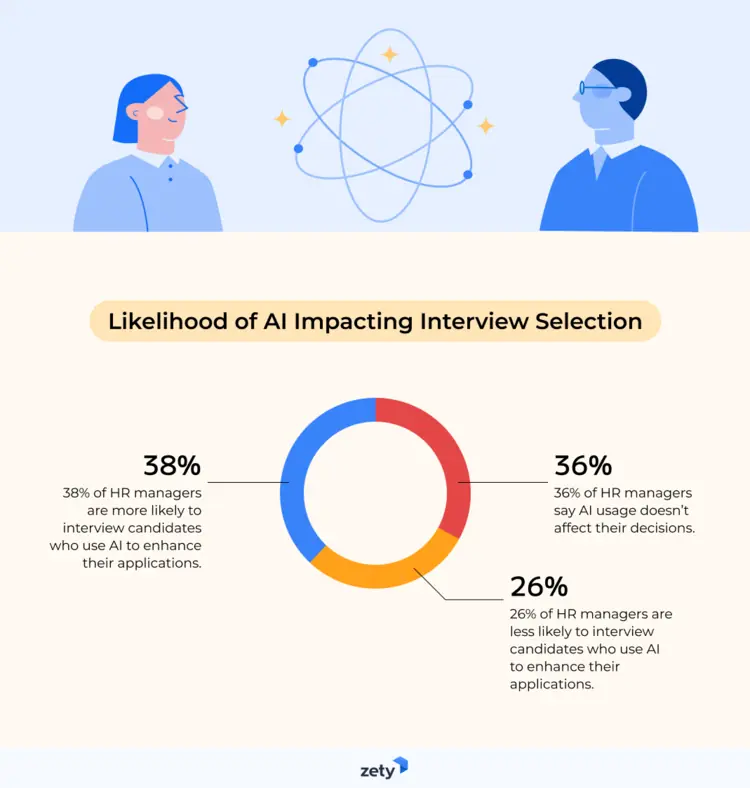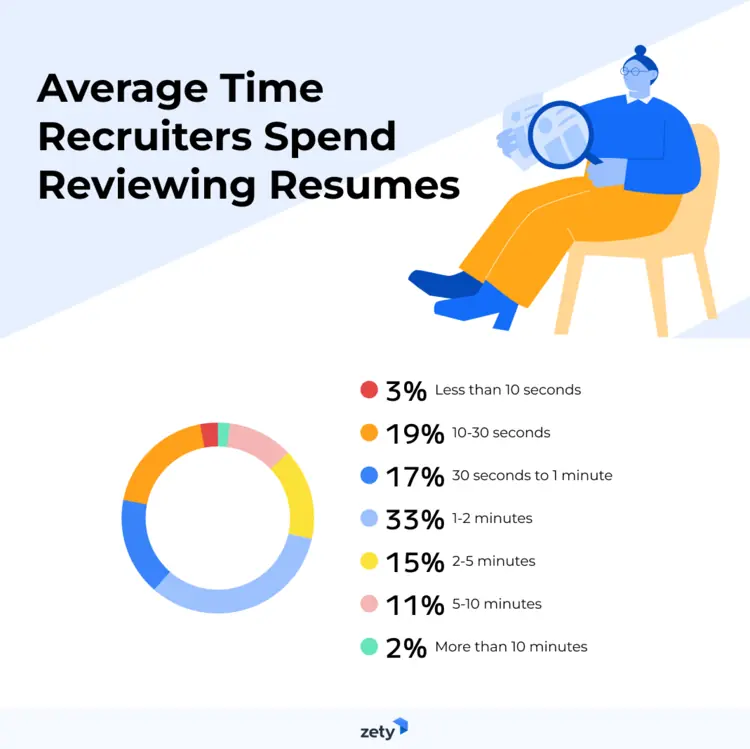Zety Releases 2025 Future of Work Report
Create Your Resume NowThe workplace is undergoing a seismic transformation, with technological advancements, shifting employee expectations, and evolving hiring practices reshaping the professional landscape. Zety’s 2025 Future of Work Report dives into the trends that will likely define the coming year, drawing insights from employees, HR professionals and recruiters.
Key findings of the 2025 Future of Work Report:
- AI upskilling efforts: 95% of employees reported that they are currently participating in training or taking other steps to improve their AI skills.
- AI tools shaping job searches: 58% of HR managers believe it’s ethical for candidates to use AI during their job search while 42% disagree.
- Lack of harassment reporting persists: 38% of employees wouldn’t report being a victim of sexual harassment to HR – 44% of women wouldn’t report this compared to 32% of men.
- Cover letters remain crucial: 87% of recruiters consider cover letters an essential factor when deciding who to interview.
AI’s Impact on Job Security
Despite a number of AI-related job losses, employees recognize the importance of AI training and upskilling as we head into 2025. Zety’s AI in the Workplace Report found that 1 in 4 people have lost a job due to AI, hitting younger generations the hardest:
- 43% of people 25 or younger (most likely to be in an entry-level position) have lost a job due to AI.
- 27% of people between the ages of 26-40 have lost a job due to AI.
- 19% of people over the age of 41 have lost a job due to AI.

With the rapid integration of AI across industries, the workforce is not only adapting but also preparing to navigate an increasingly AI-driven job market. When asked about AI use and interest in upskilling:
- 71% say they utilize AI at work.
- All respondents (100%) reported an interest in improving their AI skills.
- 95% are currently participating in training or taking other steps to improve their AI skills.
The push for AI literacy and skill development is only expected to grow in the coming year. These trends suggest a workforce entering 2025 equipped with stronger AI expertise and a readiness to adapt to technological disruptions.
HR’s Opinions on AI in the Job Search
As AI technology continues to shape hiring processes, Zety’s HR and AI Recruitment Report shows that the majority of HR professionals approve of candidates leveraging AI for essential job search tasks, including:
- Resume creation (66%)
- Cover letter writing (66%)
- Applying to jobs (59%)
While HR professionals are generally supportive of AI in the early stages of the job search, opinions vary when it comes to its influence on interview decisions.
Likelihood of AI Impacting Interview Selection:
- 38% are more likely to interview candidates who use AI to enhance their applications.
- 36% say AI usage doesn’t affect their decisions, indicating a neutral stance.
- 26% are less likely to interview candidates who rely heavily on AI.

Looking ahead to the new year, opinions on the ethics of using AI remain divided, highlighting a complex challenge for job seekers. With 58% of HR managers viewing AI use as ethical and 42% disagreeing, candidates will need to navigate this divide carefully, balancing innovation with authenticity to align with differing recruiter expectations.
Employee Comfort Levels with HR Reporting
Zety’s HR Interactions Report shows that while the majority of employees feel supported by (87%) and trust (85%) their HR department, many do not feel empowered to express their concerns freely. The study reveals a troubling silence around critical workplace issues:
- 43% wouldn’t report witnessing discrimination.
- 42% wouldn’t report witnessing sexual harassment.
- 38% wouldn’t report being a victim of sexual harassment themselves.
Gender plays a significant role in employees' willingness to report concerns, with the report uncovering notable differences between male and female employees:
- 41% of women and 44% of men wouldn’t report witnessing discrimination.
- 40% of women and 45% of men wouldn’t report witnessing sexual harassment in the workplace.
- 44% of women and 32% of men wouldn’t report being a victim of sexual harassment.
What Recruiters Look For in Applications
Initial perceptions and impressions can significantly influence hiring decisions, especially when it comes to application materials. According to Zety’s Recruiting Preferences Report, 72% of recruiters spend less than two minutes reviewing a resume:
- Less than 10 seconds (3%)
- 10-30 seconds (19%)
- Between 30 seconds and a minute (17%)
- 1-2 minutes (33%)
- 2-5 minutes (15%)
- 5-10 minutes (11%)
- More than 10 minutes (2%)

When assessing an applicant’s resume, recruiters first look at:
- Skills (39%)
- Work experience (37%)
- Professional summary or resume objective (15%)
- Education/certifications (9%)
Despite ongoing debates over the value of cover letters, data shows they will remain a critical element of the hiring process, shaping interview decisions and serving as a key consideration point for recruiters in the 2025 job market:
- Nearly 9 in 10 recruiters (89%) expect candidates to submit cover letters, with 83% stating they read them.
- 81% have rejected candidates based solely on their cover letters.
- 87% consider cover letters an essential factor when deciding who to interview.
As the workforce moves into 2025, Zety’s findings highlight the critical need for adaptation and awareness. AI continues to drive profound changes, requiring both employees and employers to embrace upskilling and ethical practices. While many challenges remain, such as harassment reporting and recruitment expectations, these insights offer a roadmap for fostering a more informed, inclusive, and future-ready workforce. By staying ahead of these trends, organizations and job seekers alike can navigate the future of work with confidence and resilience.
For press inquiries, please contact Skyler Acevedo at skyler.acevedo@bold.com.



